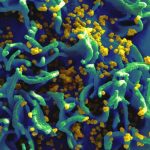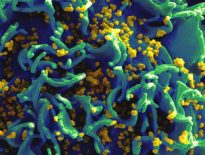Boutique brand pulls products, closes shops because of possible listeria contamination

Jeni’s Splendid Ice Creams is closing its retail stores and pulling its frozen dessert products from grocery stores because of possible listeria contamination, the second U.S. recall this week because of the potentially deadly bacteria.
Jeni’s on Thursday initiated a voluntary recall after listeria was discovered in one of its products by the Nebraska Department of Agriculture. The Columbus, Ohio, company, said it is not aware of any illnesses related to its products. It operates shops in at least seven states and sells ice cream at Whole Foods Market Inc. and other retailers around the country.
The move comes after a much-larger ice cream maker, Blue Bell Creameries LP, pulled its products from stores after the U.S. Centers for Disease Control and Prevention linked its ice cream to a listeria outbreak that has resulted in three deaths and additional illnesses. The family-owned Texas company said it is the third-largest U.S. ice-cream brand by sales.
Listeria is a virulent pathogen that thrives in cool, wet environments, and has previously prompted food companies to shut plants since it is difficult to eradicate even through plant cleanings. The pathogen typically doesn’t cause serious illnesses in healthy people but poses a threat to pregnant women, newborns, older adults and people with weakened immune systems.
Jeni’s, founded by Jeni Britton Bauer in 2002, says it uses premium ingredients bought directly from farmers and other producers, including milk from grass-fed cows located within 200 miles of its Ohio kitchen. The closely held company doesn’t disclose revenue.
Food-safety experts said that it is possible that Jeni’s and Blue Bell share a common source for ingredients that contained the bacteria, but the more likely scenario is that increased product testing is responsible for the back-to-back discoveries.
If you look more often, you’ll find it more often, said David Theno, chief executive of Gray Dog Partners Inc., a California-based food-safety consultancy that helped hamburger chain Jack in the Box Inc. rebound from an E. coli crisis in 1993. Mr. Theno said the recent listeria outbreak traced to Blue Bell likely put state health and agriculture departments on high alert for the presence of pathogens in frozen dairy products.
Last year, Washington ice-cream maker Snoqualmie Gourmet Ice Cream Inc. also issued a voluntary recall of everything it had produced for about a year after discovering some of its products were tainted with listeria. The company removed its ice cream from store shelves after public health officials linked two illnesses that resulted in hospitalization to its recalled products.
The good news for consumers, food experts say, is that federal health officials have new tools at their disposal to link seemingly disparate food-borne illness cases. Earlier this month, the CDC used whole-genome sequencing to connect listeria cases to a multistate outbreak, employing a technology that plots the entire DNA of an pathogen versus just part of it, experts said.
Whole genome sequencing is a huge tool for the CDC, said Sarah Brew, a Minneapolis attorney who represents food processors and retailers in food-borne illness cases, adding that it’s also a real opportunity for food companies to try to identify microorganisms better before products ever reach store shelves.
Write to Jesse Newman at jesse.newman@wsj.com





